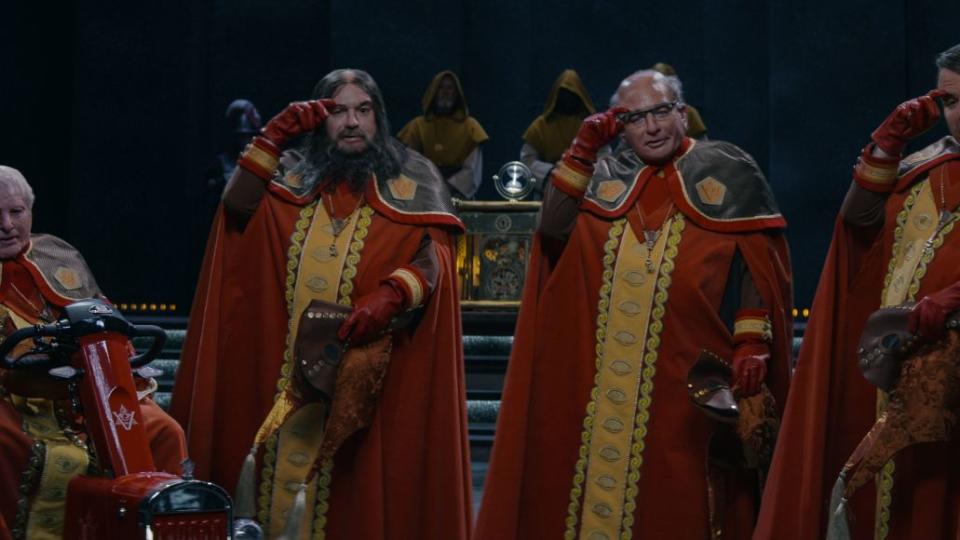The Pentaverate Review: Mike Myers Returns For a Messy, Bloated, Yet Heartfelt Comedy
- Oops!Something went wrong.Please try again later.
The post The Pentaverate Review: Mike Myers Returns For a Messy, Bloated, Yet Heartfelt Comedy appeared first on Consequence.
The Pitch: A fictitious secret society called The Pentaverate has been quietly influencing world events for the betterment of humanity ever since they discovered fleas on rats caused the Black Plague. As omniscient narrator Jeremy Irons describes, the Pentaverate is nice (unlike other secret organizations) and led by five learned men: high-ranking British official Lord Lordington, Australian media baron Bruce Baldwin, Russian ex-oligarch Mishu Ivanov, real-life rock manager Shep Gordon, and computer programmer Jason Eccleston (all performed by Mike Myers).
After Eccleston’s untimely death, the Pentaverate attempts to initiate nuclear physicist Dr. Hobart Clark (Keegan-Michael Key) and casino mogul Skip Cho (Ken Jeong), but their incorporation of these figures into their group causes more chaos than expected.
Meanwhile, aging Canadian journalist Ken Scarborough (also Myers) is being forced into retirement following a series of unsuccessful news stories. In order to keep his job at CACA News, Scarborough sees an opportunity to expose the Pentaverate, recruiting plucky camerawoman Reilly Clayton (Lydia West) and red-pilled conspiracy nut Anthony Lansdowne (also Myers) to help him navigate his mission.
As Scarborough endeavors to infiltrate the Pentaverate, he uncovers a web of lies and deception within the operation that raises even more questions about who really holds the most power over the information we receive.
Journalism Matters, It Seems: In the age of QAnon and post-Trump paranoia, conspiracy theories have become so normalized that even empirical truths are seen now as questionable. Contextualizing the growing threat of disinformation through a lens of absurdity might seem like a clever, accessible way of highlighting the danger of it.
But there’s also a risk of flattening a critique of the issue into an obvious, on-the-nose indictment of confirmation bias, preaching the very exhaustively discussed idea that we’ve become so easily duped into accepting any piece of information as factual, regardless of the source.
Netflix’s The Pentaverate aims to accomplish the former, showing how even those with morally good intentions can still weaponize and distort the truth for their own self-interest. Unfortunately, it ends up reinforcing the latter through well-meaning but surface-level platitudes about the need for more honest journalism in the face of clickbait propaganda and extremist messaging.

The Pentaverate (Netflix)
As Mike Myers’ first major comedy venture in 14 years, The Pentaverate is certainly the most competent spoof the Canadian entertainer has made since the Austin Powers trilogy, though that’s about as high as the bar goes. The six-episode series pokes fun at conspiracy theory culture to middling effect, uneasily balancing its stale, dated political humor with juvenile toilet jokes.
If you’re into that brand of silliness with a socially conscious but relatively dull edge, The Pentaverate will prove to be a decent, smooth-brained distraction. If not, it’s probably best to just sit this one out.
The Bloat Is Real: Although Myers’s penchant for goofy innuendos and cheeky wordplay provoke a few laughs, they often act as a repetitive, tiresome crutch for an already thinly sketched plot.
At times, The Pentaverate plays like a film stretched out into six bloated half-hour chapters, its early-aughts irreverence and low-hanging-fruit commentary straining to hold it all together. In fact, had it shifted toward a cinematic format, it likely would make for a serviceable two-hour feature to watch during a barren May weekend, like Will Ferrell did almost two years ago with the similarly eccentric satire Eurovision Song Contest: The Story of Fire Saga.
Even then, The Pentaverate undercuts its dramatic and comedic momentum by constantly veering into lackluster, self-referential tangents when it needs to fill up time. Myers is no stranger to including meta-references and fourth-wall-breaking in his projects and when they do work, they often add an extra dose of fun and spontaneity. Here, however, they come off more calculated than inspired, particularly when The Pentaverate aggressively points itself out as a Netflix production.
In the second episode, for example, Scarborough encounters two foul-mouthed billiards players, prompting Reilly to ask the camera why there’s so much profanity all of a sudden. Cut to a “Netflix executive” addressing the audience about the unusual nature of vulgar, R-rated content in a Mike Myers movie, then presenting the same clip without the cursing. The now-sanitized scene reveals that the non-profane dialogue actually made it seem like Scarborough was engaging in anal sex with one of the billiards players, culminating in a fake-out money shot.
The problem isn’t just that the setup is unfunny or that the wink-wink inclusion of a Netflix employee is tacky and cynical, but that the joke goes on longer than necessary and leads to an unpleasant and frankly disgusting punchline.
Myers Loves a Pop Culture Reference: Obnoxious nods to Netflix and other pop culture staples abound in The Pentaverate. During each opening theme, Jeremy Irons scolds the viewers’ supposed disinterest in his description of the show’s premise and even tries at one point to explain the plot of Stranger Things to lure the viewer into paying attention.
When Scarborough accidentally joins the Pentaverate’s security force in Episode 3, the head guard Pikeman Higgins (Richard McCabe) goes Full Metal Jacket mode, but his insults don’t quite reach the guffaw-inducing heights of Lee Ermey’s Sergeant Hartman.
Perhaps the most appalling instance of Myers’s meta-humor occurs in Episode 4 when he travels to Dubrovnik, home of the Pentaverate’s voting apparatus, and encounters the ogre of the town, who appears to be none other than… Shrek. There’s even a needle drop of Smash Mouth’s “I’m a Believer” to really drive home the ridiculous randomness of the moment.
Self-indulgent asides aside, arguably the best thing Myers manages to pull off with The Pentaverate is doing the formidable multi-hyphenate duty of creator, co-writer, and actor of eight characters in heavy prosthetics (and the voice of Shrek, I guess).

The Pentaverate (Netflix)
With the exception of his shallow impersonation of right-wing nuttery as Lansdowne and the Alex Jones-tinged radio host Rex Smith, his exaggerated cadence as Ivanov works well comedically with his explicit-sounding pronounciations of words like “focus” and “counting.” Additionally, his precise emulation of Shep Gordon’s mannerisms is a genuinely endearing homage to the famous talent manager (who was the subject of Myers’ 2013 documentary SuperMensch: The Legend of Shep Gordon).
The efforts of The Pentaverate’s supporting cast, however, is a bit more of a mixed bag. Jeong and Key imitate characters and performances they’ve done many times before, resulting in some disappointingly mechanical work from the reliably entertaining comics. Debi Mazar makes the most out of her role as the Pentavarate’s trusted executive assistant Patty Davis, imbuing some charm and wit into a character who mainly functions to move the plot forward.
Absolutely Fabulous actress Jennifer Saunders is a standout as the Maester of Dubrovnik, a grotesque-looking investigator who inquires about Eccleston’s death and gets the most laughs for berating her subordinates Anso and Ergo every time they think she’s saying their names.
The Verdict: Underneath its mildly amusing, emotionally scattered exterior, The Pentaverate is a flawed but heartfelt ode to the importance of honesty in an era where lies are widespread and popularized. “The public needs to trust the experts,” Scarborough opines in the finale, “but the experts need to serve the public.”
There’s nothing necessarily wrong about what Myers is arguing here, but Myers wants to have his cake and eat it too, and consequently, The Pentaverate frequently undermines the sincerity of his words with the uneven execution of his fatiguing antics, be it a vomit gag, a cheap pun, or a grating over-explanation.
Some of this can be forgiven with a post-credits scene that bookends the series, which shows archival footage of a young Myers meeting local Canadian journalist Glenn Cochrane. In the clip, Cochrane lets Myers pretend to be a newscaster, a role that he always wanted to play but never had the opportunity to.
Myers speaks to the camera, impersonating Cochrane, and the two then embrace in a loving hug. Coupled with a subsequent title card dedicated to local journalists everywhere, it’s a sentiment that’s sweet on its own, but, in the context of The Pentaverate, its earnestness doesn’t quite hit as hard as it meant to.
Where to Watch: The Pentaverate is streaming now on Netflix.
Trailer:
The Pentaverate Review: Mike Myers Returns For a Messy, Bloated, Yet Heartfelt Comedy
Sam Rosenberg
Popular Posts

